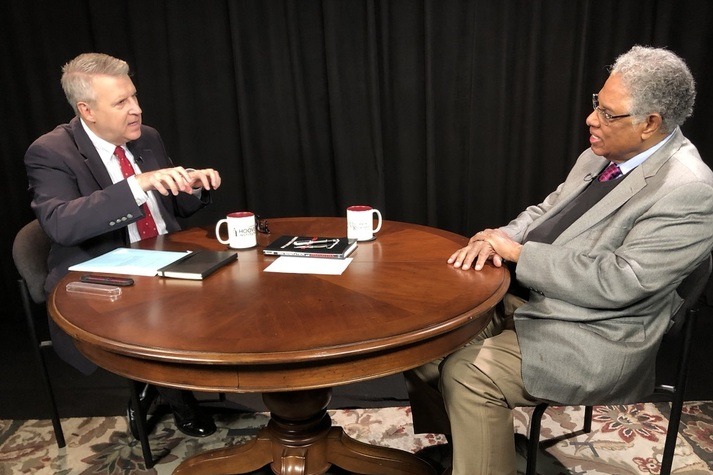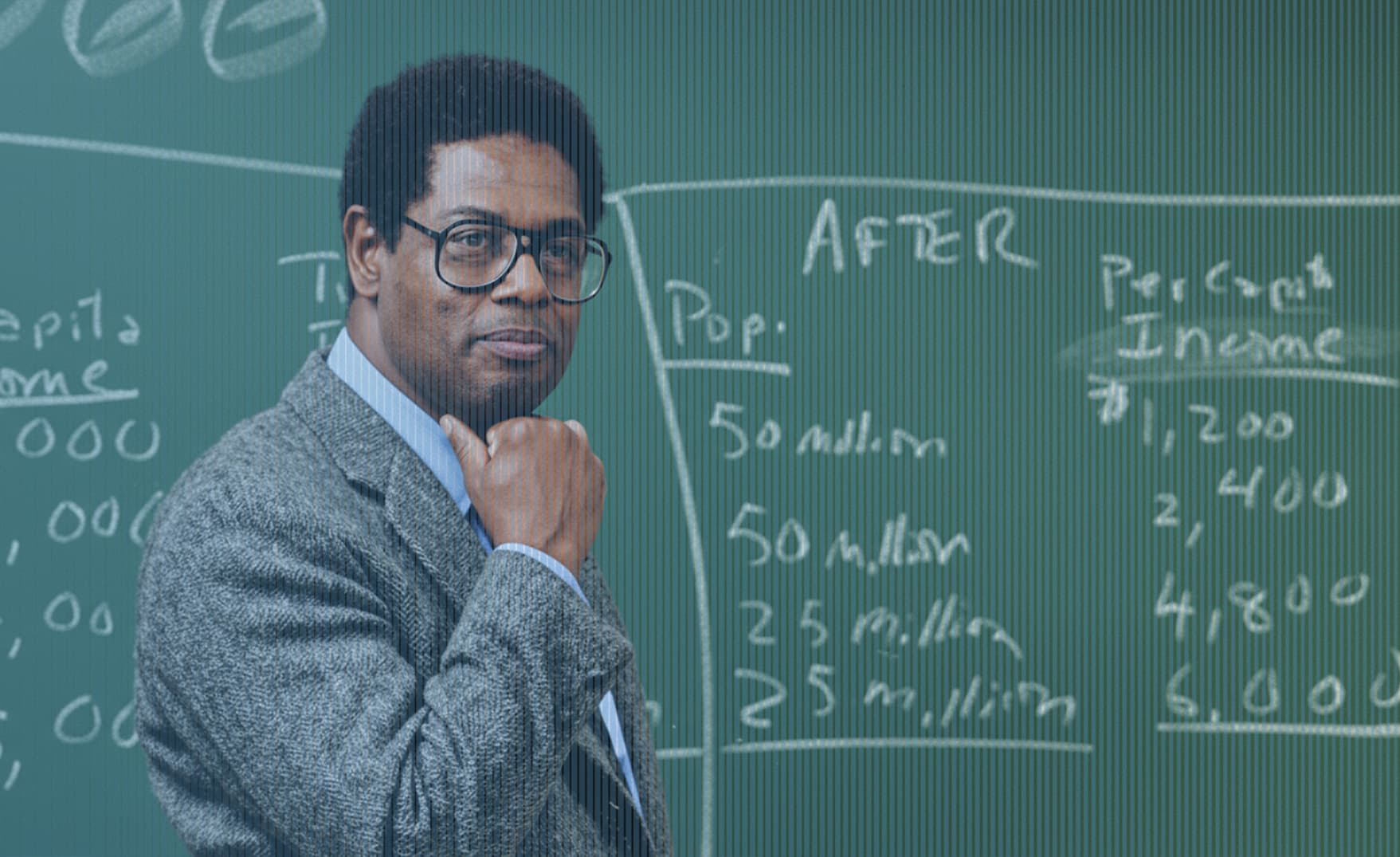In October, the Hoover Institution held a two-day celebration of the life and work of Thomas Sowell, Hoover’s renowned economist, author, and public intellectual. Prior to the conference, Peter Robinson, host of the video series Uncommon Knowledge, met with Dr. Sowell to discuss education, one of the many fields he has illuminated in his half-century-long career. Here is a sample of their conversation, which will appear in full on the Hoover Institution website (www.hoover.org) early next year:
Peter Robinson: Thomas Sowell has served for forty-eight years as a fellow at the Hoover Institution. Tom, we talked about the conversation we’re about to have today, and you said you wanted to devote it to one topic. Not economics, not race, not sociology or culture. You want to talk about education.
Thomas Sowell: The reason I have such a focus on education is that it is one of the major institutions of our society that are failing—more so, I think, than most of the other major institutions of our society. And it’s failing in two different ways. It’s failing to teach students how to think—failing to give them a background of knowledge, of history. And it’s failing to allow them to express views that are different from what is being propagandized. These have become propaganda agencies more than educational institutions. And more than that, the way education is set up as an institution, there’s nothing in it to cause them to change to correct themselves.
If you’re in private business and you’re making widgets, if you’re not making widgets that the public wants or will put up with, then you will discover that because you can’t sell them you will be losing money, and you will be forced out of business. Milton Friedman used to say that people call this a capitalist society but it’s a profits society, a profit and loss society. And the losses are just as important as the profits because the losses force people to stop doing things that are not working.
In public education, you have an almost inexhaustible amount of money from the taxpayers. Private schools are becoming private more in name than in reality—they’re getting billions of dollars of taxpayers’ money and there’s very little follow-up of what happens, so they can keep on doing things that are wrong for generation after generation. My book Inside American Education is one that I want to have people take a look at—not because it’s a new book, but precisely because it’s an old book. Reading it, you see that things we have newly discovered that are wrong with the schools—sometimes as a result of the COVID pandemic and the homeschooling that came out of that—but those things have been like that for thirty years or more.
Any idea that the public can keep up with what is going on in the schools in any serious way is false. You have to have something, some mechanism, by which the schools can be changed, or the people can be allowed out of those schools.
Peter Robinson: As I read your life story—and we’ve known each other for a long time—I see why one of the reasons you feel so deeply about education is the difference it made in your life. As a child you moved from North Carolina to Harlem. There you met a kid named Eddie, and Eddie took you to a strange institution. Could you tell us about that?

Thomas Sowell: Oh, yes. Eddie came from a much better educated family than I did. But my family appreciated education and therefore, even before I arrived in New York, they had picked out Eddie as someone I must get to know because he can tell me things that they don’t know and introduce me to parts of the world they’re not familiar with. And the first thing he did was take me to a public library. I came into this big building with enormous numbers of books. I wondered, why am I here? I don’t have enough money to buy even one book. I was already thinking like a Chicago economist. Eventually, he convinced me to reluctantly take out a library card and to borrow a couple of books. And, since I arrived in the summer, I had no school to go to and there were no kids nearby, so I started becoming a reader. After a while, it became a habit, but I had no idea at the time what the significance of this would be. Without that, the rest of the story would not have been the same.
Peter Robinson: Here’s another point that I’m very struck by that you have made in our conversations over the years. From emancipation, from the end of the Civil War to before the Civil Rights Acts and before the civil rights movement of the 1960s, do African-Americans remain immured in the status of former slaves? No. They get educations, they’re making tremendous progress. It’s a missing century. Why isn’t that part of our history?
Thomas Sowell: I think a good part of it is that it would undermine the things people are doing now—things that are supposed to be advancing people who are low income and less educated. They want to take credit for the progress that’s been made as if it all started with the 1960s.
I’ve written about Dunbar High School. Out of Dunbar there came the first black man to graduate from the Naval Academy at Annapolis, the first black general in the Army, the first black cabinet member, the first black man to become a full professor at a nationally known university. I think I’ve left out one or two . . . there was also a doctor who became internationally known because of his work on blood plasma. I wrote about it in the course of the whole educational effort following the 1954 decision by the Supreme Court that separate schools were inherently unequal. It so happens that Dunbar High School was located within walking distance of the Supreme Court that declared its existence impossible. Whenever people paid any attention at all to my work on Dunbar High School—and there were very few—they spent their time trying to discredit its relevance.
Peter Robinson: In your 2020 book, Charter Schools and Their Enemies, you examine a number of schools. It’s a good number of years after you grew up in Harlem. But you went back to Harlem, and you discovered charter schools. That were using classrooms in public school buildings drawing from the same population, being taught in the same buildings under the same New York State curricula as those in the public schools. And here’s what you found: that not only did the kids, mostly black and Hispanic, do better than minority kids in public schools. But on one subject after another, they tested better than white kids out in the suburbs. Yet the charter schools were under intense political pressure from liberals. As you wrote, “It is a painful irony that people who are promoting the make-believe equality of inclusion and diversity in schools are attacking charter schools that are producing the real equality of educational achievement.”
Thomas Sowell: Their whole vision of the world is one in which the government has to step in and rescue blacks. The liberals pre-empt this decision-making of blacks and other groups who have been low income and are having difficulties, and it will never occur to them that those people know their own situation far better than any liberal knows it. One of the people who have written about this says openly that he really has not looked at the data, but he’s been writing articles and books showing why you shouldn’t support charter schools. And he said, well, obviously the parents don’t know enough to be able to pick the right schools for their kids, and something has to be done about it. Facts are really a danger to the egos of a lot of people with high IQs and low information.
Peter Robinson: Let me give you two quotations. President Lyndon Johnson, in 1965, at the very beginning of the civil rights legislation, says, “You do not take a person who for years has been hobbled by chains and bring him up to the starting line of a race and then say, ‘you are free to compete with all the others.’ It is not enough.” Then there’s Frederick Douglass: “Everybody has asked the question, what shall we do with the Negro?” That was the word in those days. “I have had but one answer from the beginning. Do nothing with us. If the apples will not remain on the tree of their own strength, if they are worm-eaten at the core, if they are early ripe and disposed to fall, let them fall. I am not for tying or fastening them on the tree in any way. And if the Negro cannot stand on his own legs, let him fall also.” If you had to choose between Lyndon Johnson and Frederick Douglass, which would you choose?
Thomas Sowell: It would be Frederick Douglass all the way. As you know, he was born a slave. He escaped. He educated himself and made his living writing books and newspapers and so forth. One of his books, for example, was reprinted in recent years. And the irony was that all sorts of footnotes were added to it, you see, because this man, who probably never spent a day in school in his life, the language that he uses and mastered has to be explained to our expensively undereducated students today so they’ll know what he’s referring to. It is such a painful irony.
This interview was edited for length and clarity.
Thomas Sowell is the Rose and Milton Friedman Senior Fellow on Public Policy at the Hoover Institution. A renowned and globally recognized public intellectual, Sowell is the author of numerous influential and bestselling books on topics including economics, education, history, social policy, ethnicity, and the history of ideas.
Peter Robinson is the Murdoch Distinguished Policy Fellow at the Hoover Institution and host of Hoover’s video series program, Uncommon Knowledge. A former White House speechwriter, Robinson wrote the historic Berlin Wall address, in which President Reagan called on Soviet General Secretary Mikhail Gorbachev, to “tear down this wall.”
